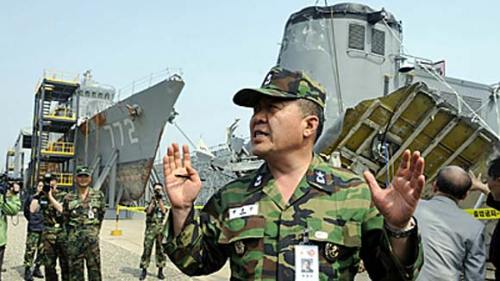
by Corey Flintoff
May 21, 2010 Tensions between North and South Korea have escalated after an international investigation determined that a North Korean torpedo sank the South Korean naval vessel Cheonan, killing 46 sailors in March.
The dilemma for South Korea, and its close ally, the United States, is how to respond in a way that will punish the North without risking war.
Secretary of State Hillary Clinton condemned North Korea on Friday. At a news conference in Tokyo with Japan’s foreign minister, she said “I think it is important to send a clear message to North Korea that provocative actions have consequences.”
Clinton told reporters that it would be premature to give details about a possible response, but she said the response must be international, rather than regional.
North Korea was unequivocal in its response, denying responsibility and saying that any retaliation would mean all-out war.
There are few, if any, good options.
South Korean President Lee Myung-bak called the sinking a “military provocation,” but added that his government cannot afford to make any mistakes in responding “and will be very prudent in all response measure we take.”
Retaliation Not Feasible Without Risking Wider War
South Korea has a more modern, better-equipped military than the North, backed by some 28,000 U.S. troops. But the close quarters of the two small countries on the Korean Peninsula mean that the South is still vulnerable.
Seoul, the South Korean capital, is within range of artillery from North Korea.
Even the threat of war could hurt South Korea’s economy, which has been boasting a strong recovery from the global recession, by driving off investors.
White House spokesman Robert Gibbs stopped short of calling North Korea’s action an act of war, choosing instead to label it an “act of aggression.”
“For the South, it’s pretty clear that there’s not an appetite for a military confrontation,” says Scott Snyder, the director of U.S.-Korea policy at the Asia Foundation.
South Korea is expected to bring the matter to the United Nations Security Council next week, seeking tougher sanctions on the North’s already-restricted trade.
The South Korean news agency, Yonhap News, also quoted government sources as saying the South could block North Korean vessels from using sea routes through South Korean waters.
Investigators Say Evidence Is Overwhelming
The South Korean vessel broke in two and sank after an explosion on March 26, in waters near the border with North Korea. A joint team of civilian and military experts from South Korea, the U.S., Australia, Britain and Sweden said evidence “points overwhelmingly to the conclusion that the torpedo was fired by a North Korean submarine. There is no other plausible explanation.”
The investigation cited North Korean lettering on torpedo parts that were dredged from the ocean bottom by South Korean trawlers.
North Korea says the evidence was fabricated and denies that it had any part in the Cheonan sinking.
China, the North’s traditional ally, has said it will conduct its own assessment of the findings.
John Park, a Korea expert at the United States Institute of Peace, says the investigation was scientifically conducted, “and about as transparent as these things get,” but he says there’s still a public perception in Asia, and especially in China, that the sinking could have been accident.
If the investigation’s conclusion is true, why would the North risk an act that could provoke open war?
Snyder says the attack could be related to the North’s own internal power struggles over establishing a successor to ailing leader Kim Jung-il.
“Another possibility is that they’ve essentially been caught by technology,” says Snyder. He adds that the North Koreans may not have expected such a thorough investigation into the cause of the sinking.
Snyder says the North Koreans may have thought they could send an aggressive message to the south with an attack that could never have conclusively been pinned on them.
An Attention-Getting Move?
“One of the biggest issues in all this,” Snyder says, “is that the North Koreans feel that South Korea has begun to look past them.” Past South Korean administrations, he says, made the North such a high priority that the North learned it could get economic aid without have to do much in return.
Now, Snyder says, the current government of South Korean has made relations with the North a relatively low priority. “The main motive,” he says, may be “to send a message that you can’t ignore us.”
The investigating team’s report has created a dilemma for the U.S., says Park. “The U.S. is only now getting the beginnings of cooperation with China and Russia on Iran.” At some point, he says, the U.S. may have to decide whether North Korea or Iran is a bigger priority.
Park also calls the situation “the worst possible diplomatic nightmare for China. They need to have good relations with both North Korea and South Korea.”
Park says Chinese leaders have been trying to persuade North Korea to undertake economic reforms through a delicate process of institution building. That process could easily be upset if the North feels that China is favoring its rival to the south.



